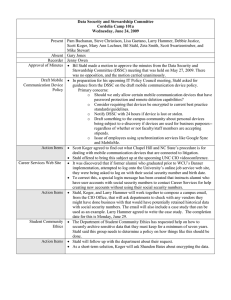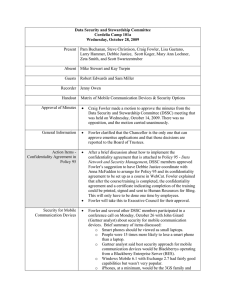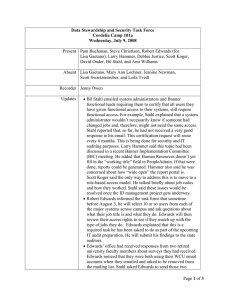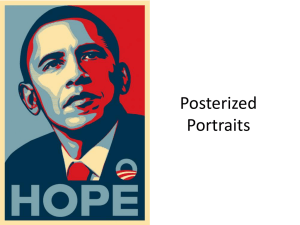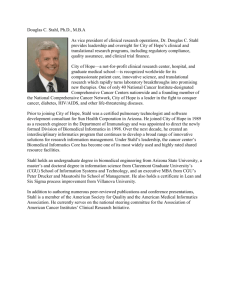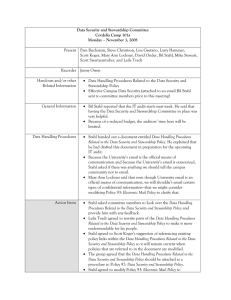Document 12141088
advertisement
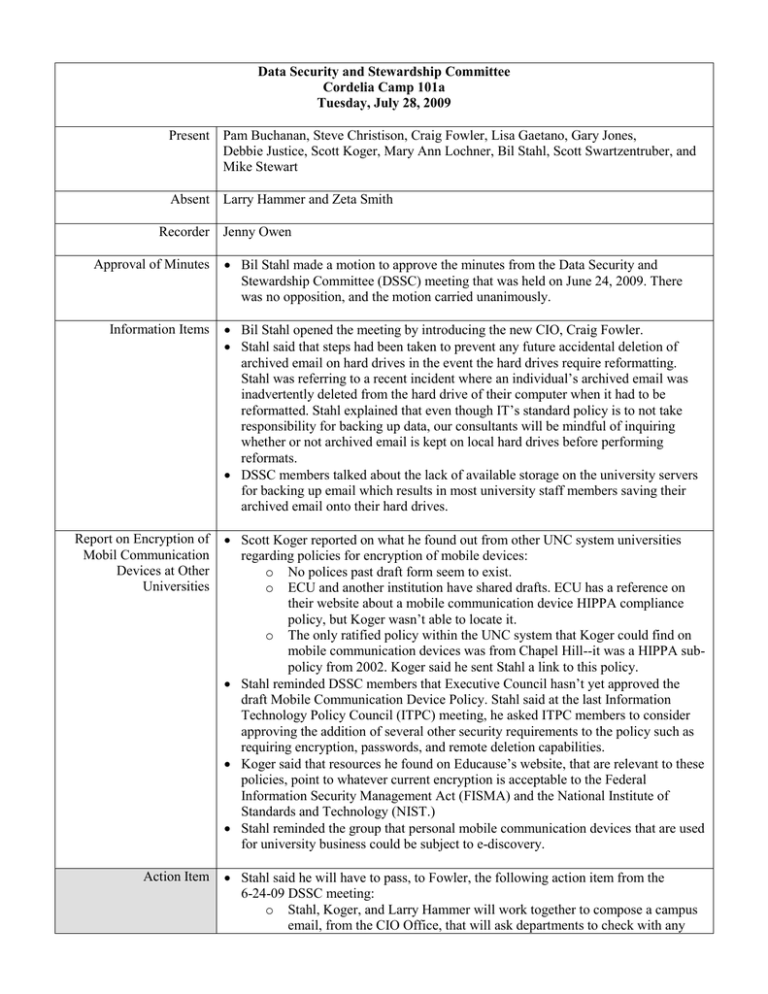
Data Security and Stewardship Committee Cordelia Camp 101a Tuesday, July 28, 2009 Present Pam Buchanan, Steve Christison, Craig Fowler, Lisa Gaetano, Gary Jones, Debbie Justice, Scott Koger, Mary Ann Lochner, Bil Stahl, Scott Swartzentruber, and Mike Stewart Absent Larry Hammer and Zeta Smith Recorder Jenny Owen Approval of Minutes Information Items Report on Encryption of Mobil Communication Devices at Other Universities Action Item Bil Stahl made a motion to approve the minutes from the Data Security and Stewardship Committee (DSSC) meeting that was held on June 24, 2009. There was no opposition, and the motion carried unanimously. Bil Stahl opened the meeting by introducing the new CIO, Craig Fowler. Stahl said that steps had been taken to prevent any future accidental deletion of archived email on hard drives in the event the hard drives require reformatting. Stahl was referring to a recent incident where an individual’s archived email was inadvertently deleted from the hard drive of their computer when it had to be reformatted. Stahl explained that even though IT’s standard policy is to not take responsibility for backing up data, our consultants will be mindful of inquiring whether or not archived email is kept on local hard drives before performing reformats. DSSC members talked about the lack of available storage on the university servers for backing up email which results in most university staff members saving their archived email onto their hard drives. Scott Koger reported on what he found out from other UNC system universities regarding policies for encryption of mobile devices: o No polices past draft form seem to exist. o ECU and another institution have shared drafts. ECU has a reference on their website about a mobile communication device HIPPA compliance policy, but Koger wasn’t able to locate it. o The only ratified policy within the UNC system that Koger could find on mobile communication devices was from Chapel Hill--it was a HIPPA subpolicy from 2002. Koger said he sent Stahl a link to this policy. Stahl reminded DSSC members that Executive Council hasn’t yet approved the draft Mobile Communication Device Policy. Stahl said at the last Information Technology Policy Council (ITPC) meeting, he asked ITPC members to consider approving the addition of several other security requirements to the policy such as requiring encryption, passwords, and remote deletion capabilities. Koger said that resources he found on Educause’s website, that are relevant to these policies, point to whatever current encryption is acceptable to the Federal Information Security Management Act (FISMA) and the National Institute of Standards and Technology (NIST.) Stahl reminded the group that personal mobile communication devices that are used for university business could be subject to e-discovery. Stahl said he will have to pass, to Fowler, the following action item from the 6-24-09 DSSC meeting: o Stahl, Koger, and Larry Hammer will work together to compose a campus email, from the CIO Office, that will ask departments to check with any vendors they might have done business with that would have potentially retained historical data with social security numbers. The email will also include a case study that will provide an example. Larry Hammer agreed to write the case study. Governor’s Directive on Archiving Email MaryAnn Lochner reported on the Governor’s directive/executive order to archive email of high-level executives for 10 years. Lochner said UNC-GA is researching whether or not this executive order applies to the university system. The University of North Carolina General Records Retention and Disposition Schedule is what the UNC system uses as their official guideline for archiving public records. Action Item Lochner reminded the group that Electronic Mail Policy (Policy 93) needed to be revised “sooner rather than later.” She said she will have to work with IT on this. After the policy has been revised, Lochner added that a substantial education effort about the policy will have to be arranged for the campus community. Lochner said her vision is to have a compliance web page with direct links to training. Windows Live Contract Action Item Lochner reported that our Windows Live contract had expired and that GA was in the process of negotiating “a uniform contract.” GA is also negotiating with Google about their email system. Lochner commented that it would be good to have some provision in the contracts about retention, maintenance, mining, and retrieval of emails that are classified as FERPA. Lochner will email Fowler links to three documents: The University of North Carolina General Records Retention and Disposition Schedule; E-mail as a Public Record in North Carolina: A Policy for Its Retention and Disposition; and the NC Identity Theft Protection Act.
